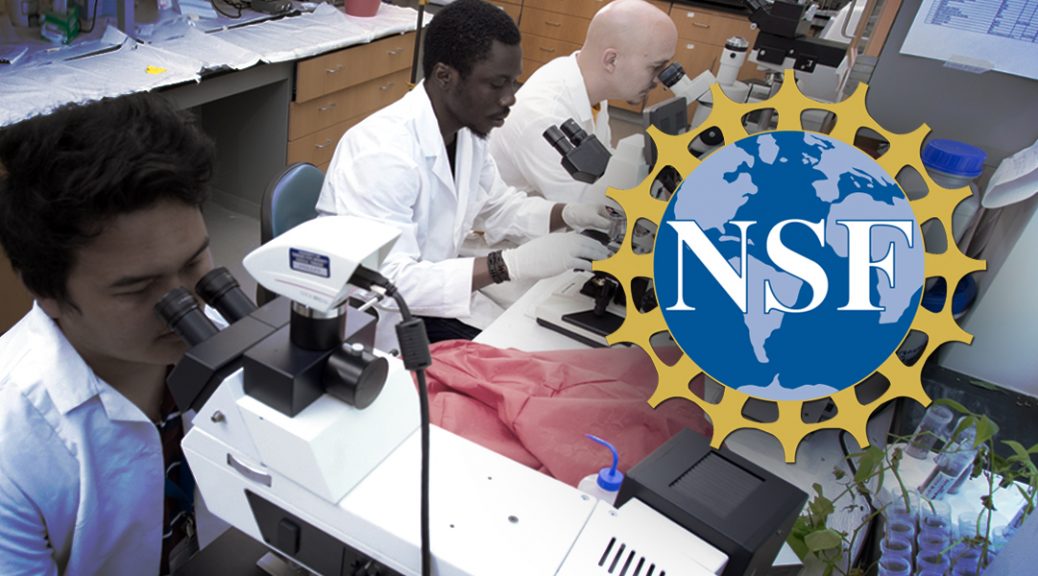NASHVILLE, Tenn. (TSU News Service) – Science, engineering and education researchers will have a unique opportunity to gain insight about how to secure research funding from the National Science Foundation (NSF) at a workshop on February 22 at Tennessee State University.
The daylong workshop, dubbed NSF Day, will include discussions about how to submit fundable proposals, as well as discipline-specific breakout sessions featuring NSF representatives. This is the first time NSF Day is being hosted in Nashville.
“We are excited to bring an NSF Day to Tennessee State University,” said Holly Brown, NSF Lead for the TSU NSF Day. “Not only do these events provide a phenomenal opportunity for us to share vital information on our proposal and merit review processes, we are able to engage with some of the brightest minds in science and engineering.”

One student who has benefited from TSU’s partnership with NSF is Robert Turner, a senior mechanical engineering major from Nashville, Tennessee. Turner said working on an NSF funded research project has enhanced his experience at TSU in many ways.
“It has given me a perspective on what I would like to do for graduate school,” he said. “It is also exposing me to different technologies that I wouldn’t necessarily get exposed to throughout my undergraduate curriculum.”
After graduation, Turner plans to pursue a graduate degree in material science. He said working with Dr. Frances Williams, associate dean for Graduate Studies and Research in the College of Engineering, has helped him expand his breadth of knowledge and given him the opportunity to network within the field of engineering.
“Dean (Williams) has always been helpful to me by setting me up with the right opportunities and helping me whenever I needed it,” he said. “The other researcher assigned to the project, Dr. Yury Barnakov, has also been helpful, as well as the graduate student that I am working with.”
John Barfield, TSU director of engagement and visibility in the Division of Research and Institutional Advancement, said students are the primary beneficiaries when universities receive research funding.
“Research projects train students to use innovative and new techniques,” he said. “They aid them in becoming accepted to internships, and graduate and medical schools. Research becomes paid jobs and scholarships for students, both of which increase student retention and matriculation rates.”
The NSF is the federal agency created by Congress in 1950 “to promote the progress of science; to advance national health, prosperity, and welfare; and to secure the national defense,” according to the foundation’s website. NSF supports fundamental research in science, engineering and education across all disciplines.
Dr. Marie Hammond, TSU professor of psychology and principal investigator for two NSF grants currently funded at the university, said her research is geared toward constructing a framework for a theory of African American STEM career development.

Hammond said that she, along with a team of other researches at TSU, are attempting to increase the ability of African Americans to commit to and manage their STEM careers to ensure that they have the greatest likelihood of persisting to graduation and into the next phase of their STEM careers.
“The reason this research is so important is because the STEM workforce is primarily made up of Caucasian males.,” Hammond said. “Think about what we are missing with only 5% of African Americans spread out across all the STEM fields. What are we missing that African American men and women would pick up on to help improve healthcare, safety and our living environments.”
Hammond has secured close to $2.5 million in funding from NSF during her career at TSU, which has allowed her to hire a total of almost 50 graduate assistants. Currently, she has nine graduate assistants who aid with research, as well as four undergraduate students who collect data.
Nicholas Kovach, research specialist in the TSU Division of Research and Institutional Advancement, said the university secured more than $2 million from NSF in the last fiscal year. He said NSF representatives will be on hand all day to answer questions and personally engage in discussions with attendees.
“This is a rare opportunity,” he said. “The National Science Foundation holds only a few of these workshops each year, at different institutions across the country, and they are coming here to our campus.”
NSF Day provides background on the foundation, its mission, and priorities. Program managers and staff give overviews on proposal writing, programs that fall within and across NSF’s seven scientific and engineering directorates, and NSF’s merit review process.
Presale admission tickets are available on the TSU Research and Sponsored Programs website: http://www.tnstate.edu/research/. Admission includes parking on the main campus with a shuttle service downtown, breakfast, lunch, and light snacks throughout the day.
For additional information about the NSF Day program, visit www.nsf.gov/nsfdays
Department of Media Relations
Tennessee State University
3500 John Merritt Boulevard
Nashville, Tennessee 37209
615.963.5331
About Tennessee State University
With more than 8,000 students, Tennessee State University is Nashville’s only public university, and is a comprehensive, urban, co-educational, land-grant university offering 38 bachelor’s degree programs, 25 master’s degree programs and seven doctoral degrees. TSU has earned a top 20 ranking for Historically Black Colleges and Universities according to U.S. News and World Report, and rated as one of the top universities in the country by Washington Monthly for social mobility, research and community service. Founded in 1912, Tennessee State University celebrated 100 years in Nashville during 2012. Visit the University online at tnstate.edu.
